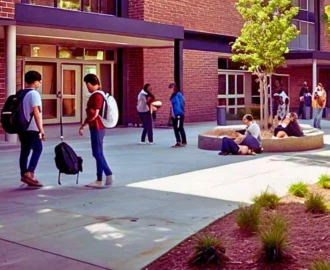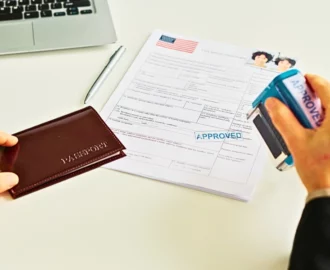What happens if a petitioner dies after your i-130 is approved? If a petitioner passes following the approval of Form I-130 during the application process, you may be able to continue with your status adjustment, depending on the circumstances.

If you need help completing the immigration process and reinstating your petition, call The Law Offices of Cheng, Cho, & Yee, PC, at 312-853-3088 to consult an immigration lawyer about your case.
What Happens to the Approved I-130 Petition?
Before 2009, U.S. Citizenship and Immigration Services (USCIS) would automatically revoke I-130, Petition for Alien Relative, if the petitioner died even after approval. As a result, beneficiaries would need to request a reinstatement of the petition before being able to continue the application process.
However, in 2009, the government issued a new provision that would enable beneficiaries to move forward with the immigration process under certain circumstances. If the individual qualifies, he or she may be able to reinstate the petition’s approval with INA 204(I) relief.
There are qualifications that you must meet if you want to effectively reinstate your family sponsorship application.
What Is the Impact on the Beneficiary’s Ability to Adjust Status?
One of the big immigration myths debunked is that you will no longer be able to apply for adjustment of status if a petitioner dies, as this is an outdated condition. Depending on the situation, you may still be able to have your petition reinstated if you meet the requirements.
These requirements include:
- You were living in the U.S. when the petitioner died
- You were in the U.S. when USCIS approved the application
- You are a beneficiary with authorized access to enter the country through valid means, such as asylum, a family-based immigrant visa, or an employment-based visa
Also, you must meet all other adjustment requirements to move forward.
What Is a Qualifying Relative?
Before you can continue applying for an adjustment of status, you will need to prove that the deceased petitioner was what USCIS calls a “qualifying relative.” If the person did not fall under this category, you may need to find someone else who does before you can have USCIS reinstate your petition.
There are certain individuals who count as qualifying relatives, according to Congress. For example, the petitioner would be a “qualifying relative” if he or she was petitioning for either an immediate relative or a family-sponsored immigrant visa petition. He or she may also meet this definition if he or she was the principal beneficiary of either an employment-based immigrant visa petition or a widow or widower’s self-petition.
The USCIS website lists all the situations when petitioners count as qualifying relatives.
What if You Were Temporarily Out of the Country When the Relative Died?
If the petitioner passed while you were abroad and not currently in the U.S., this generally won’t impact your ability to continue with your petition. As long as you were living in the U.S. when the petitioner died and USCIS approved the petition, you would still be able to progress with your case.
How Your Immigration Lawyer Can Help You Address Challenges
While you may have the ability to continue with a family sponsorship application after a petitioner dies, there are challenges that can complicate your situation. To help you overcome these challenges, it might be best to work with experienced family immigration lawyers who know how to handle these types of cases.
With the help of an immigration lawyer, you can:
Evaluate Your Options
A good lawyer can let you know the options available to you based on your situation, whether you want to continue with a family-sponsored petition or you want to know your legal rights when getting deported. A lawyer can also determine if there are other ways to enter the U.S. legally, such as through student or tourist visas.
Depending on your situation, you might also ask your attorney questions like, “What types of immigration cases do lawyers handle?” and “How much will it cost to hire your services?” The lawyer should be able to answer these and other questions to determine whether the attorney is a good fit.
Prepare Documentation
In addition to helping you determine the best avenue to take in your case, a lawyer can prepare Form I-130 and many other documents, ensuring that the information is accurate and current.
Your attorney can also prepare supporting documents that work with other immigration forms, such as identification, birth certificates, marriage certificates, and many others.
Keep in mind that submitting accurate and consistent documents is essential for succeeding with any type of immigration case. As such, an attorney can be an invaluable asset when getting your documentation ready for submission.
Get Representation in an Immigration Court
When applying for a green card or any other type of immigrant or nonimmigrant visa, you may need to appear in an immigration court or immigration official. For instance, you may need to complete an interview before receiving your visa, in which case your lawyer can help you adequately prepare answers and represent you during the interview process. He or she could even appear in court to represent you if you face removal or deportation, making a clear and concise argument in your favor.
Appeal a Denial or Removal Order
While USCIS approves 88% of applications for lawful permanent resident (LPR) status alone, it still denies 12%, many of which denials can be reversed with the right steps.
If you ever face removal or deportation or receive an application denial, your immigration attorney can appeal the decision and work with you to reverse the outcome. For example, your attorney might be able to discover that USCIS made a mistake during the application process, with evidence to prove that the mistake was behind your denial.
When to Hire an Immigration Lawyer
If a petitioner dies when applying for Form I-130 or you simply need help with immigration processes, the following are some main reasons for hiring a lawyer:
You’re Not Sure Which Steps to Take
When you’re uncertain about how to approach the immigration process, a lawyer will be able to give you clear guidance. An example here would be recommending other types of visas if, for some reason, you are unable to continue with family-sponsored immigration. You’ll receive advice on which forms to file and when to successfully apply for an immigrant or nonimmigrant visa.
The Application Process Is Confusing
There is a lot to keep track of when filing for adjustment of status and other immigration matters. To simplify the process, work with a lawyer that can organize documents, help you complete all information, and ensure you file on time and at the right locations.
You Need to Appear in Court
Whether you need to appear in court regarding initial immigration matters or you face removal, it’s important never to appear in court on your own. Saying or doing the wrong thing could compromise your case. A lawyer will be able to represent you during this process to build your case and proceed with it.
You Want to Speed Up the Immigration Process
Another reason for hiring a lawyer is to simply expedite the immigration and approval process. The right lawyer may be able to take certain steps to move you to a different immigrant category or implement other measures to help you receive approval faster.
How to Find the Right Lawyer for Your Case
Not every immigration lawyer is the same, which is why you’ll want to find the best attorney to represent you in your specific case.
The following are some key items to look for in an immigration lawyer if you want reliable representation:
- An attorney who has handled similar cases to yours in the past
- A long track record of success
- Plenty of experience in immigration law
- Relevant certifications
- The ability to effectively handle your case and maintain communication
If you feel that an attorney isn’t a good fit for you, it may be in your best interest to consult another lawyer. Consult with multiple lawyers, asking questions and taking notes to better determine which one is right for your case.
Reach Out to Reputable Immigration Attorneys
To increase your chances of succeeding with a case, whether you need help with Form I-130 petitions, representation during deportation, or other issues, connect with the right attorney for the best possible results. Our experienced team of lawyers will be able to provide you with the legal services you require to successfully handle nearly any immigration issue.
We have represented many clients over the years, providing them with tailored services to resolve immigration challenges and keep the immigration process consistently smooth. Want to learn more about what our law firm can do for you? Contact us today to consult the experienced Chicago family immigration attorneys at The Law Offices of Cheng, Cho, & Yee, PC.




